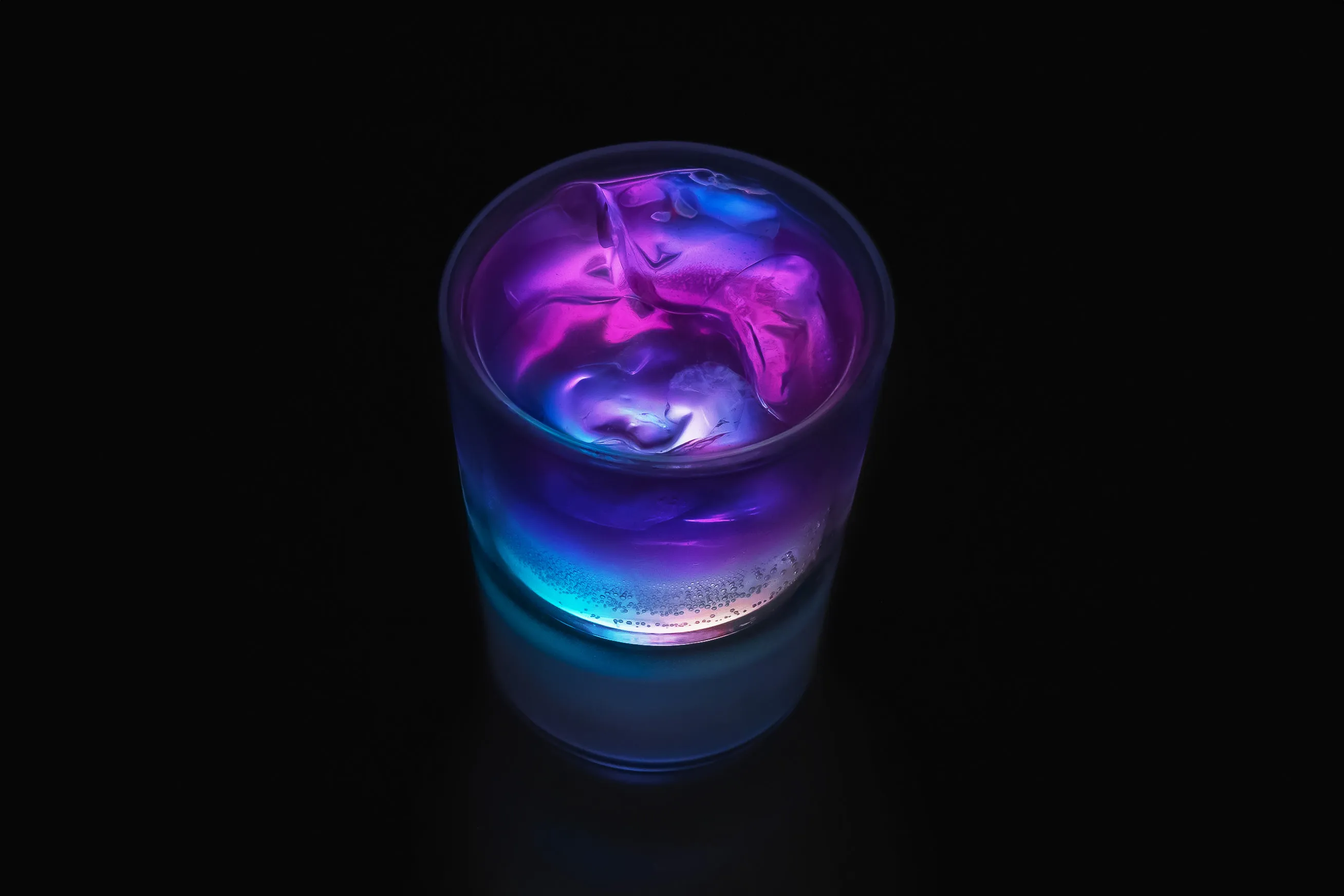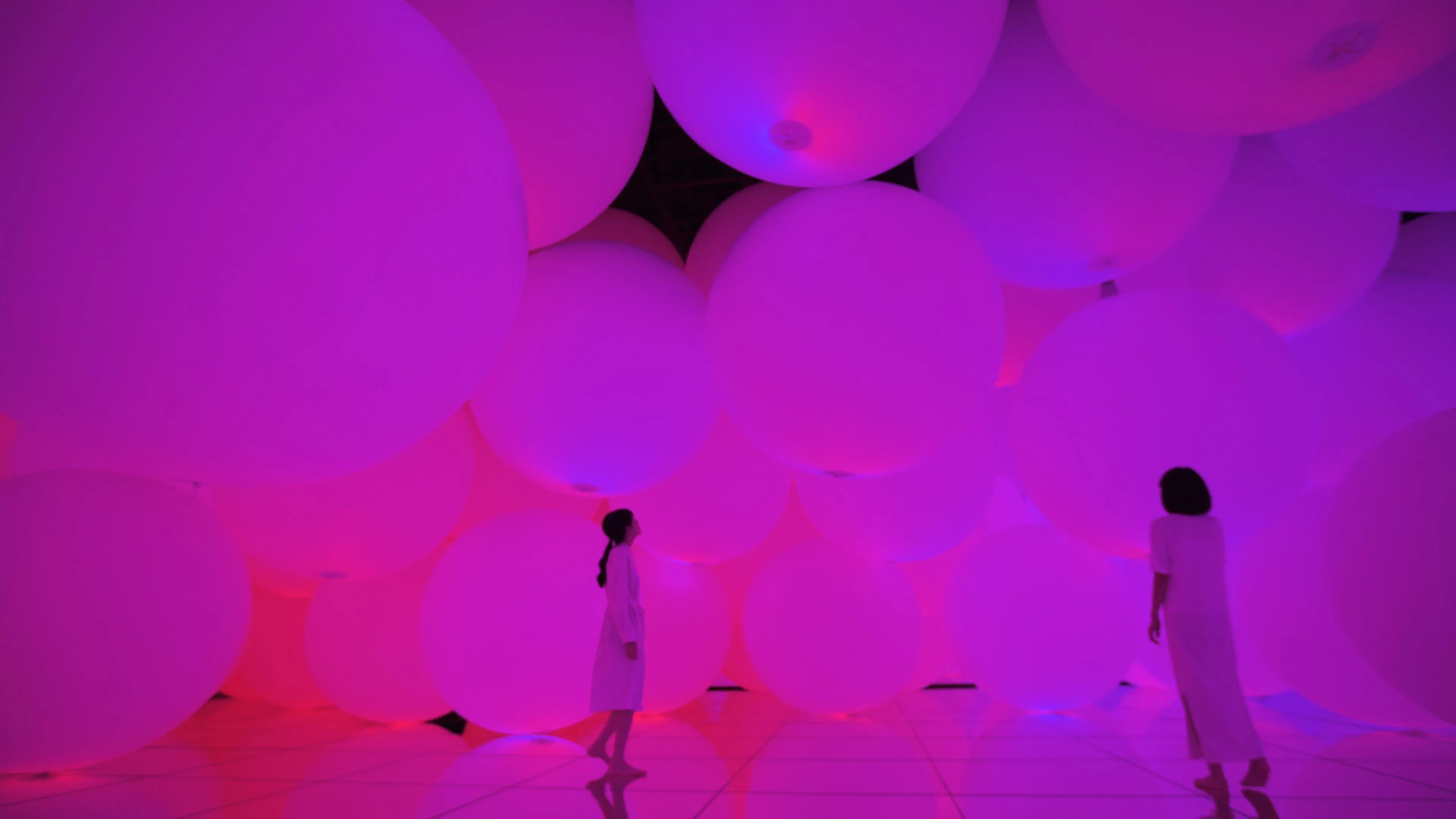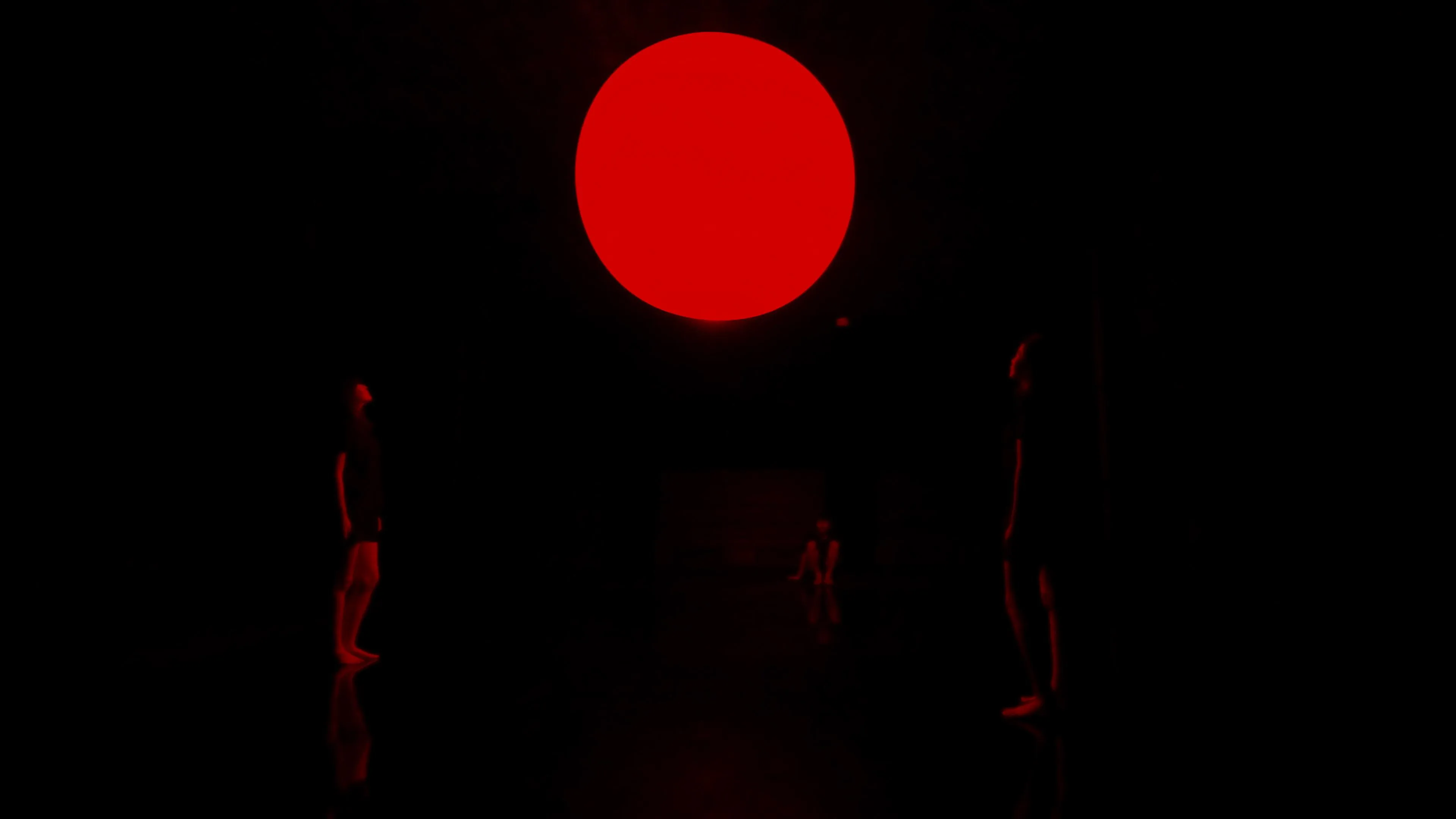
New Expressions and Concepts of Color
2018
FEATURED WORKS

Resonating Microcosms - Liquified Light Color, Dusk to Dawn
teamLab, 2020, Interactive Digital Installation, Sound: Hideaki Takahashi, Production Support: Hirohito Saito (OryZa Design), Shinya Yoshida (SYD INC.)
As the sun sets, the ovoids shine by themselves. When an ovoid is pushed by a person or blown by the wind it falls down and then rises, a sound resonates out, and it emits a light color specific to the sound. The ovoids around it also respond one after another, making the same tone sound, and emitting the same light color that continues to resonate out. And the surrounding Resonating Trees also respond and change continuously.
The ovoids begin to flicker slowly when the wind is quiet and people do not push them.
Because the ovoid colors are produced by light, it is possible for them to change into 57 different liquified light colors.

Tea in Spontaneous Order - Dynamic Steady State Color
teamLab, 2021, Interactive Installation, Endless, Sound: teamLab
When a cup of tea is made, Tea in Spontaneous Order glows and produces a tone with its own rhythm.
Tea in Spontaneous Order interacts with nearby Tea in Spontaneous Order and the Floating Lamps in Spontaneous Order, causing a spontaneous order phenomenon, in which the flickering rhythms converge.
The artwork is born when the tea is made, and disappears when the tea is drunk.
The color of the tea as a whole does not change; that is, when viewed from a distance, it remains the same color, but inside the tea the color is constantly changing, and this color has a time structure.
Through simple local interactions between Tea in Spontaneous Order and the nearby Tea in Spontaneous Order and Floating Lamps in Spontaneous Order, a time structure is created throughout the entire space of the artwork. Drink part of the order that has been formed.
A spontaneous order phenomenon occurs when different rhythms influence each other and become aligned. Examples include when the pendulums of two clocks gradually begin to swing together, when many fireflies gather in one tree and all start flashing at the same time, creating a larger light phenomenon, or when the cells that make up the heart synchronize and tremble simultaneously to create the beating of the heart. The phenomenon of self-organization is the creation of a large structure with order resulting from the autonomous behavior of each individual, even though each individual does not have the ability to observe the whole. This can also be called a self-organization phenomenon.
It is believed that entropy (a measurement of the lack of order in a system) in the universe will steadily increase (the law of increasing entropy) and that entities with form eventually collapse. However, the reason why the universe, life, nature, and society are able to exist in spite of this may be because order is born by itself through the common phenomenon of self-organization in the midst of disorder. In other words, the universe and our own existence are a continuous order created by the same phenomenon.

teamLab, 2018, Interactive Installation, Endless, Sound: Hideaki Takahashi
The space is filled with spheres of free floating light. People move through the spheres and enter the space. When people move through or strike them, the spheres change color, and that color resonates out. The spheres around that sphere change color tone and in turn resonate out the color in three-dimensions to nearby spheres.
When the spheres change color, the space itself shifts between a collection of spheres forming a three-dimensional space and a flat color wall.
Even if each sphere moves freely on its own, the behavior of light is maintained across the whole of the space (a three-dimensional image in which one sphere is regarded as one dot). Therefore, the light behaves as a group and can be thought of as one three-dimensional existing space. At this time, the light spreads spherically around the impacted sphere.
Since each sphere is free floating within the collection of sphere elements that make up the three-dimensional space, people recognize it as existing three-dimensionally and part the spheres entering into the three-dimensional existing space.
The shape of the space is determined by the collection of floating spheres and changes according to people's actions (pushing or colliding). Depending on the degree of entanglement of the spheres, and wind and pressure changes, the shape of the space itself will change, empty spaces becoming high density, and spheres rising to the ceiling all at once.
Before the modern era in Japan, Kasane no Irome were seasonal colors created in silk. The colors were the result of a combination of front and back colors, (silk at the time was so thin that the liner was transparent, creating complex colors), overlapping color gradations, complex weave colors, and combinations of warp and weft. Since the sphere colors are produced by light, it has been possible to create nine blurred colors, (light in water, sunlight on water plants, morning glow, morning sky, sky at twilight, peach, plum, iris, spring maple), as well as 3 colors that flatten the space (blue, red, and green), producing a total of twelve colors.

Levitation - Flattening Red and Blue & Blurred Violet
teamLab, 2021, Digital Installation, Sound: Hideaki Takahashi
In the artwork space, an order of energy is created, just like life.
The sphere is not supported by anything. Nevertheless, through the order of energy, the sphere transcends the concept of mass: it levitates in the space between the floor and ceiling, floating up and down. When a person taps the sphere, it floats away, falls to the ground, and rolls away. But if there is no external interference, it will slowly rise into the air again, as though restoring itself to its original state.
The sphere also appears to shift between two and three dimensions.
What is life? Viruses, for example, are considered to exist somewhere between living and inanimate, because they do not have cells, the smallest unit of biological life, and they do not reproduce. What separates the living from the inanimate cannot be defined biologically to this day.
That you continue to be tomorrow who you are today is against the law of increasing entropy, wherein tangible things collapse. In other words, in a universe where entropy (a measurement of the lack of order in a system) is supposedly being maximized, life is an entity that resists this trend. Life can be thought of as a “supernature” phenomenon: an occurrence that defies the laws of classical physics.
Physicist and 1977 winner of the Nobel Prize in Chemistry, Ilya Prigogine, observed that in the natural world, when energy is absorbed from an external source, internal entropy is generated, then released. Prigogine discovered that there exists a non-equilibrium state that is only realized when this entropy is released. Through the dissipation of energy (or matter) and the removal of entropy, internal entropy is reduced and order is created. It can be said that living organisms take in energy from the outside in the form of food, disposing of entropy in the form of excrement, thereby preserving entropy.
Life can be thought of as an order of energy that is continuous with the external environment.
The existence of life can be thought of as a Supernature Phenomenon that defies the laws of physics. When an order of energy is created within the artwork space, the sphere transcends universal gravitation, violating physics as life does. The sphere slowly levitates, becomes suspended in the middle of the space, and floats up and down in the air.
When a person views the Supernature Phenomenon before them, it causes their perception to change, thus leading to a new cognitive experience that differs from that of everyday life.
This artwork aims to explore changes in cognition.